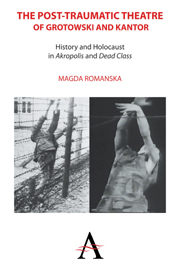 The Post-traumatic Theatre of Grotowski and Kantor
The Post-traumatic Theatre of Grotowski and Kantor from Part I - Our Auschwitz: Grotowski's Akropolis
In 1969, in his review of Grotowski's production, Irving Wardle quotes Polish critic Boleslaw Taborski as saying that “Grotowski's company was little prized in its own country until it won its reputation abroad, that is: from spectators who knew not a word of Polish and were dependent for understanding on non-Polish speaking converts like Raymonde Temkine and Grotowski's own statements of intention in Towards A Poor Theatre.” Contrary to what Wardle suggests, however, Grotowski's fame abroad was never the basis for his purported recognition in Poland. On the contrary, the fact that Grotowski became a guru to America's flower-power generation actually contributed to marginalization of his work and his methods in Polish theatrical circles. This contradiction may seem bizarre at first, but praise for an Eastern European artist in the West, with a corresponding loss of prestige in his native country, was not unique to Grotowski. Czesław Miłosz, the Polish poet and writer who served as cultural attache of the communist People's Republic of Poland in Paris right after World War II, and who defected and received political asylum in France, is another example of how success in the West often diminished the status of the Eastern European artist in his homeland. In 1960, Miłosz emigrated to the USA, and shortly thereafter became an American citizen. After Miłosz's defection, he was branded a traitor and his books banned by the communist government.
To save this book to your Kindle, first ensure [email protected] is added to your Approved Personal Document E-mail List under your Personal Document Settings on the Manage Your Content and Devices page of your Amazon account. Then enter the ‘name’ part of your Kindle email address below. Find out more about saving to your Kindle.
Note you can select to save to either the @free.kindle.com or @kindle.com variations. ‘@free.kindle.com’ emails are free but can only be saved to your device when it is connected to wi-fi. ‘@kindle.com’ emails can be delivered even when you are not connected to wi-fi, but note that service fees apply.
Find out more about the Kindle Personal Document Service.
To save content items to your account, please confirm that you agree to abide by our usage policies. If this is the first time you use this feature, you will be asked to authorise Cambridge Core to connect with your account. Find out more about saving content to Dropbox.
To save content items to your account, please confirm that you agree to abide by our usage policies. If this is the first time you use this feature, you will be asked to authorise Cambridge Core to connect with your account. Find out more about saving content to Google Drive.